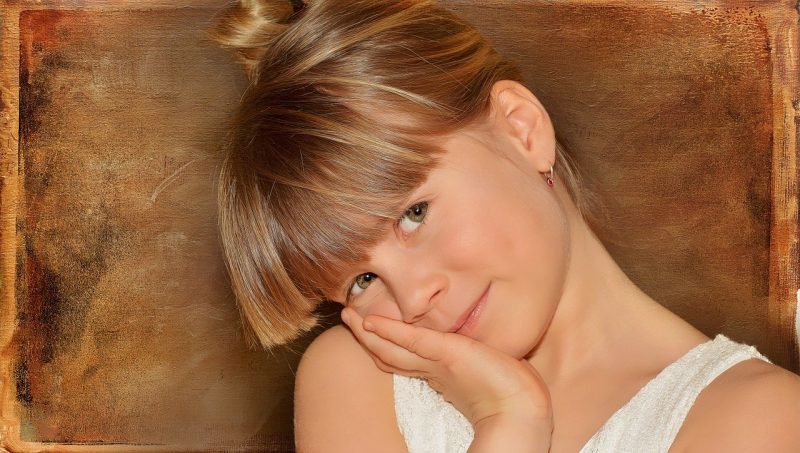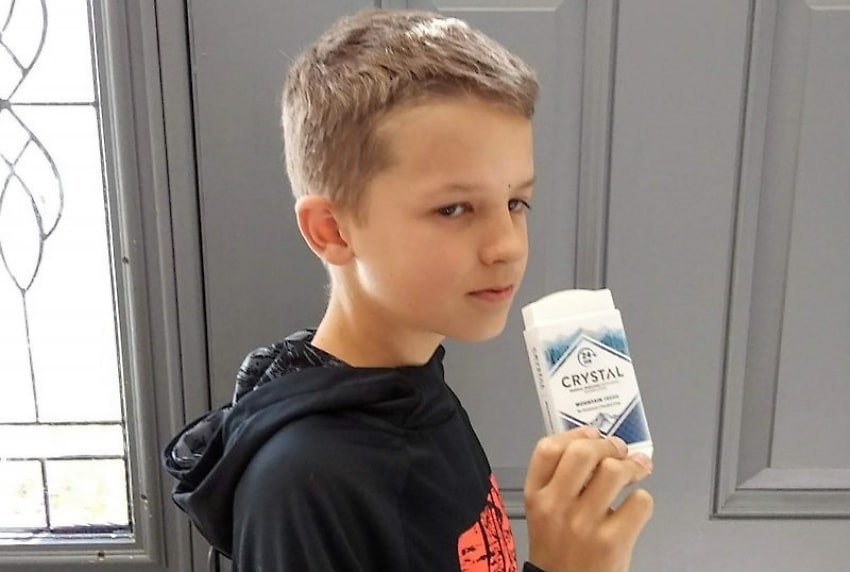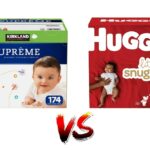It can be hard to realize that your little ones are growing up, but puberty makes it impossible to ignore. One minute they are spitting baby food, and the next they’re showing all the signs of puberty.
Along with puberty comes the stench of body odor. This is when children should start wearing deodorant. In regards to how old you should be to wear deodorant, it depends on when your child starts puberty.
In this article
How Old Should You Be To Wear Deodorant?
For most children, this age will vary. Girls typically start puberty earlier than boys, at 9-14 years old. Some may start earlier, at eight. Other girls can start much later, at 15 or 16 years old.
On the other hand, boys are a couple of years later than girls. Most boys start puberty at 10-15 years old.
A good indicator that it’s almost time for deodorant is when you start to notice underarm hair. If you haven’t noticed body odor yet, you’ll start to notice it soon after your child develops underarm hair.
When should children start wearing deodorant depends on when they start to have body odor. If your child develops body odor before underarm hair, it’s time to consider deodorant.
Keep in mind that this is a personal choice you and your child should agree on. There is no specific age that children should start.
Children Can Wear Deodorant At Younger Ages
My littlest occasionally wore deodorant at four. It wasn’t because she needed it, but because she thought it was fun to put it on when I put mine on.
View in gallery
Other children might have a slight odor that simply makes you wonder if it’s time for them to start wearing some, but they may be on the younger side, such as seven.
If you feel that your child should start wearing deodorant at an earlier age, it won’t hurt them. How old one can start wearing deodorant could be a matter of preference for parents and children as well.
Having The Hygiene Talk
Wondering when should children start wearing deodorant is the easiest part of this stage of development. Having the hygiene talk that comes with handing them a stick of deodorant is a bit more difficult.
There is a certain way to do this to make sure that your child does not feel embarrassed.
Include It In The Puberty Talk
If your child is old enough to discuss puberty with, such as 11, then you can simply include the hygiene talk in with the puberty talk. As you talk to your child about the changes that their body is going through, mention that body odor is a part of puberty.
Inform them that it’s due to changes in their body and that it happens to everyone.
Don’t Call Them Out On Having Body Odor
Do not specifically tell your child that they are the smelly kid. Chances are that if your child has body odor, they already know it.
Instead, tactfully mention that you have noticed them sweating more or simply tell them it’s time to start wearing deodorant every day and that you already picked them up some.
Puberty is a sensitive time for most children, so make sure that you don’t make them feel more awkward during this already awkward time.
Have The Talk Privately
Make sure that you have the talk with your child one-on-one, or with their other parent. If you take them out to lunch where other people can hear, it can be embarrassing.
If siblings are involved, it can be even more embarrassing and lead to other siblings teasing them. Instead, a gentle, private approach is needed for this subject.
Keep It Age-Appropriate
Prices pulled from the Amazon Product Advertising API on:
Product prices and availability are accurate as of the date/time indicated and are subject to change. Any price and availability information displayed on [relevant Amazon Site(s), as applicable] at the time of purchase will apply to the purchase of this product.
While you can explain puberty to a seven-year-old, this is far too young to explain the birds and the bees. Instead, talk about how their body is changing because they are growing up.
Explain that it happens to everyone as they get older, but sometimes it happens a little bit sooner for some children. Older children, such as teenagers, are old enough to hear the talk about the birds and the bees along with the puberty talk.
Chances are that they already learned some of this in health class or from friends, so you can simply ask them what they already know.
Fill in the blanks, such as contraception if you believe in using birth control. If not, include what your family practices as a method of prevention.
Antiperspirant
When you decide that it’s time for your child to start wearing deodorant, you’ll come across some that are labeled deodorant, and others that are an antiperspirant.
View in gallery
It’s important to know the difference so that you can make the best choice possible for your child.
What Does Antiperspirant Do?
This product is designed to prevent sweating. Since most body odor is caused by sweating, it prevents body odor before it starts by preventing the sweat that causes it.
This can be especially helpful if you notice that your child primarily has an odor after sweating, such as during hot weather or after playing sports.
If you’re wondering when children should start wearing deodorant, but you’re only thinking about it after sports games, it’s a sign that you might want to consider an antiperspirant.
Are Antiperspirants Full Of Toxic Ingredients?
One of the primary reasons that parents shy away from antiperspirant deodorants is due to the claim that they are packed with toxic ingredients. According to these claims, these products are known to cause cancer, especially breast cancer.
This article explains more about the ingredients in question and informs you of how safe these products are. If you’re concerned about breast cancer, there’s no need to be. Your child can wear any antiperspirant that an adult can.
Deodorant
Deodorant is another product that you will come across in the aisle. Often, deodorants and antiperspirants are side-by-side, but they are two different products. The primary difference is that they work in different ways.
What Does Deodorant Do?
Deodorant doesn’t block sweating. Instead, it helps mask the odor that goes hand in hand with sweating.
View in gallery
Most deodorants do this with a perfume, and with ingredients that help cover up body odor better than most perfumes and body sprays are capable of doing.
Most parents that are buying deodorant for a younger child, such as a 9-year-old, prefer to buy deodorant that is specially formulated for children. These come with fun, child-friendly designs that most children enjoy.
- ALL DAY PROTECTION: Contains 3 - 1.6-ounce sticks of Toms of Maine Wicked Cool Deodorant in Girls Summer Fun scent. This natural deodorant is Toms first for kids, providing 24-our odor protection.
- ALUMINUM-FREE: Toms natural deodorant for kids is specifically designed for boys and girls and does not contain aluminum, artificial fragrances, or preservatives.
- DESIGNED FOR KIDS: Toms aluminum free deodorant is formulated just for kids with a fragrance to keep them confident all day long.
Prices pulled from the Amazon Product Advertising API on:
Product prices and availability are accurate as of the date/time indicated and are subject to change. Any price and availability information displayed on [relevant Amazon Site(s), as applicable] at the time of purchase will apply to the purchase of this product.
Antiperspirant vs. Deodorant
When choosing a product for your child, it’s important to pick one that will work for them. Sporty children are prone to sweating and might need something stronger than a deodorant, especially during the summer.
Younger children or kids that do not sweat a lot will be fine with a deodorant. Most parents start off with a deodorant, and if it is ineffective, they switch to an antiperspirant.
Watch For Signs Of Skin Sensitivity
The primary concern with younger children using a deodorant is that their skin is often more sensitive than adult skin. Because of this, they are more likely to develop a reaction to these products.
Signs of an adverse reaction include:
- Bumps
- Blisters
- Itching
- Burning
- Redness
- Irritation
- Scaly or flakey skin
If this is due to the product being used, it will only occur in that area. If you notice that your child has a rash in their underarms after using a particular deodorant or antiperspirant, stop use immediately and opt for a different product.
Natural Products
Natural products are a popular option for parents that have a child with sensitive skin. Usually, they don’t contain aluminum and other chemicals that are known to be harsh on the skin.
Instead, natural products contain plant-based ingredients that mask body odor as other deodorants do. Due to the chemicals used in antiperspirants, it is more difficult to find a natural antiperspirant.
- Aluminum Free- Native Deodorant isn’t a chemistry experiment, and is made without aluminum, parabens, phthalates, and talc
- Effective Protection- We tested thousands of ingredients before finding a recipe that feels light and fresh under your arms, but provides you with effective protection against odor and wetness
- Goes on Easy- Native Deodorant is a solid deodorant that you can apply easily. Since the deodorant doesn’t contain aluminum, it won’t stain your clothes
- Cruelty Free- Native Deodorant never tests on animals, except humans who volunteer to try Native Deodorant
Prices pulled from the Amazon Product Advertising API on:
Product prices and availability are accurate as of the date/time indicated and are subject to change. Any price and availability information displayed on [relevant Amazon Site(s), as applicable] at the time of purchase will apply to the purchase of this product.
Deodorants For Sensitive Skin
If you already know that your little one has sensitive skin, it’s a great idea to skip the guesswork and start off with a deodorant that is specially formulated for sensitive skin.
Popular brands, such as Dove, have products available that are not harsh on the skin yet still work as well as other deodorants do. As a general rule of thumb, the younger a child is the more sensitive their skin is.
- Gentle and hypoallergenic antiperspirant deodorant for sensitive skin
- Provides all day wetness and odor protection
- Quick-drying gel leaves no trace of white residue on you or your clothes
- Dermatologist and allergy tested
- Fragrance free and alcohol free
Prices pulled from the Amazon Product Advertising API on:
Product prices and availability are accurate as of the date/time indicated and are subject to change. Any price and availability information displayed on [relevant Amazon Site(s), as applicable] at the time of purchase will apply to the purchase of this product.
Alternative Options
If deodorants that are specially formulated for sensitive skin are also breaking out your child’s underarms, trying alternative options is a great idea!
This website has a recipe for homemade deodorant that is free from many of the chemicals found in commercial products, instantly making it a great idea for young children.
Taking two showers a day, and showering after sports practice are both great ways to keep the level of bacteria down. Add some antibacterial body wash into their hygiene routine for their underarms and you’ll notice a difference as well.
These alternative options can all be used together to help combat body odor.
Final Word
When trying to answer the question of how old do you have to be to wear deodorant, it’s important to remember that there is no specific age.
Whenever your child needs to wear deodorant, have a talk with them about it. Then, educate yourself on the various products available to make sure that you choose the right one for your child.






